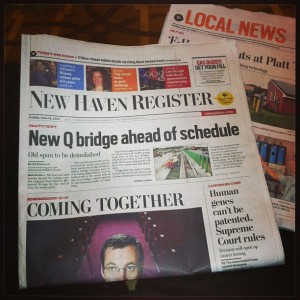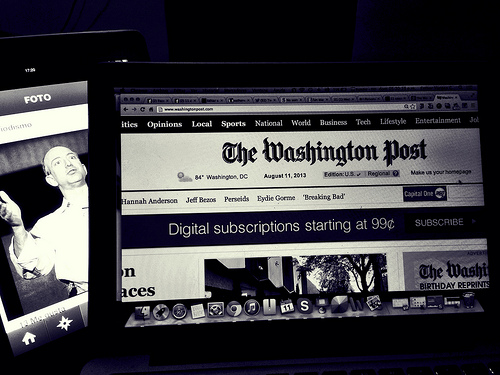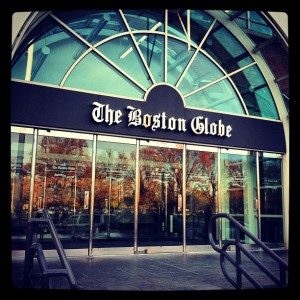This article was published earlier at The Huffington Post.
The end may be near for one of the most widely watched experiments in local journalism.
Early today, Ken Doctor reported at the Nieman Journalism Lab that Digital First Media was pulling the plug on Project Thunderdome, an initiative to provide national and international content to the company’s 75 daily newspapers and other publications and websites. Soon, Doctor added, Digital First’s papers are likely to be sold.
Judging from the reaction on Twitter, the news came as a shock, with many offering their condolences and best wishes to the top-notch digital news innovators who are leaving — including Jim Brady, Robyn Tomlin and Steve Buttry. But for someone who has been watching the Digital First story play out in New Haven for the past five years, what happened today was more a disappointment than a surprise.
I first visited the New Haven Register, a regional daily, in 2009. I was interviewing people for what would become “The Wired City,” a book centered on the New Haven Independent, a nonprofit online-only news site that represents an alternative to the broken advertising-based model that has traditionally supported local journalism. The Register’s corporate chain owner, the Journal Register Co., was in bankruptcy. The paper itself seemed listless and without direction.
Two years later, everything had changed. Journal Register had emerged from bankruptcy and hired a colorful, hard-driving chief executive, John Paton, whose oft-stated philosophy for turning around the newspaper business — “digital first” — became the name of his blog and, eventually, of his expanded empire, formed by the union of Journal Register and MediaNews, the latter best known for its ownership of the Denver Post.
Just before Labor Day in 2011, Matt DeRienzo — then a 35-year-old rising star who had just been put in charge of all of Journal Register’s Connecticut publications, including the New Haven Register — sat down with me and outlined his plans. His predecessor had refused my requests for an interview; DeRienzo, by contrast, had tracked me down because he’d heard I was writing a book. It seemed that a new era of openness and progress had begun.
The openness was for real. The progress, though, proved elusive. For a while, John Paton was the most celebrated newspaper executive in the country, the subject of flattering profiles in the The New York Times, the Columbia Journalism Review and elsewhere. Media reporters were charmed by his blunt profanity, as when he described a presentation he gave to Journal Register managerial employees. “They were like, ‘Who’s the fat guy in the front telling us that we’re broken? Who the fuck is he?'” Paton told the CJR.
In 2012, though, Journal Register declared bankruptcy again — a necessary step, Paton said, as it was the only way he could get costs such as long-term building leases and pension obligations under control. After Journal Register emerged from bankruptcy in 2013, Paton’s moment in the national spotlight seemed to have passed, as media observers turned their attention to a new breed of media moguls like Amazon.com founder Jeff Bezos (who bought The Washington Post), Red Sox principal owner John Henry (who bought The Boston Globe), greeting-card executive Aaron Kushner (who acquired the Orange County Register) and eBay founder Pierre Omidyar (who launched a new venture called First Look Media).
Although Digital First’s deepening woes may have escaped national attention, there were signs in New Haven that not all was well. Some positive steps were taken. The print edition was redesigned. The Register website was the beneficiary of a chain-wide refurbishing. Nasty, racist online comments were brought under control, and the newsroom embraced social media. But larger improvements were harder to accomplish.
Among the goals Matt DeRienzo had talked about was moving the paper out of its headquarters, a hulking former shirt factory near Interstate 95, and opening a smaller office in the downtown. In 2012, the Register shut down its printing presses and outsourced the work to the Hartford Courant. The second part of that process never came, though. Just last week, the New Haven Independent reported that the Register had backed away from moving to a former downtown mall facing New Haven Green. Two months earlier, according to the Independent, the Register and Digital First’s other Connecticut publications laid off 10 people.
Neither development should be described as a death knell. The downtown move is reportedly still in the works. And the 10 layoffs were at least partly offset by the creation of six new digitally focused positions. But rather than boldly moving forward, the paper appears to be spinning its wheels. And now — or soon — it may be for sale.
One of the biggest problems Digital First faces is its corporate structure. Can for-profit local journalism truly be reinvented by a national chain whose majority owner — Alden Global Capital — is a hedge fund? People who invest in hedge funds are not generally known for their deep and abiding affection for the idea that quality journalism is essential to democratic self-goverance. Rather, they want their money back — and then some. Preferably as quickly as possible.
No matter how smart, hard-working and well-intentioned John Paton, Jim Brady, Matt DeRienzo et al. may be, the Digital First experiment was probably destined to end this way, as chain ownership generally does. I wish for a good outcome, especially in New Haven. Maybe some civic-minded business leaders will buy the paper and keep DeRienzo as editor. And maybe we’ll all come to understand that the best way to reinvent local journalism is at the local level, by people who are rooted in and care about their community.








